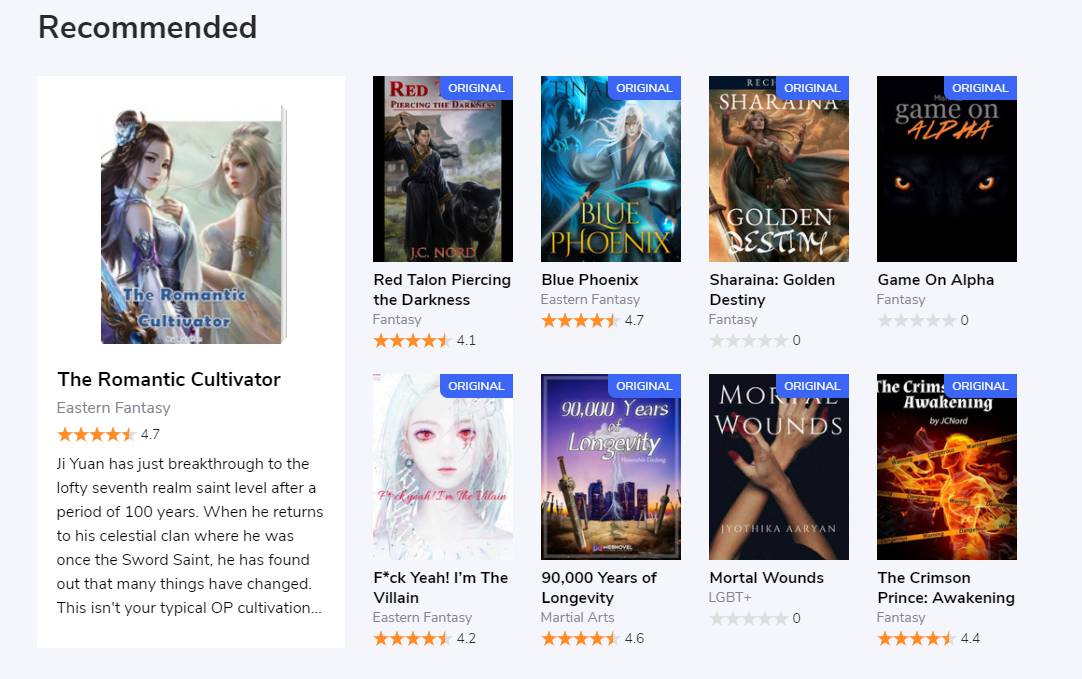Traditional culture shines in online literature

A screenshot of Webnovel, an online literature platform featuring English novels under China Literature.
The "2023 China Online Literature Development Research Report" was recently released by the Literature Research Institute of the Chinese Academy of Social Sciences.
The report showed that in 2023, the numbers of online literature authors, works and readers all grew steadily, totaling 24.05 million authors, 36.2 million works and 537 million users. Writers in their 20s and early 30s are the main force in creating online literature. Most writers do not have a professional literary education background and are mostly part-time writers.
The report indicated that in 2023, online literature increasingly incorporated China's traditional culture into various themes and genres, with a notable focus on historical, realistic, and science fiction themes.
The first "Reading Intangible Cultural Heritage" essay competition, sponsored by the Chinese Ministry of Culture and Tourism's Prince Kung's Palace Museum and Yuewen Group, featured over 60,000 works on intangible cultural heritage themes, covering 127 projects such as Peking opera, wood carving, papermaking techniques, and lion dance.
Suo Luo, a member of the China Writers Association's Network Literature Committee, explained that online literature not only mirrors the public's aesthetic preferences and national cultural spirit in the internet era but also inherently embodies a "Chinese" essence. This inherent quality makes it seamlessly integrate with traditional culture, meeting the audience's reading preferences.
Furthermore, the widespread promotion of traditional culture from all sides has stimulated the infusion of traditional Chinese culture into online literature. For example, many literary websites have organized themed creation activities centered around "intangible cultural heritage," fostering a diverse recreation of traditional culture within online literary works.
AI-Generated Content (AIGC) was a global hot topic in 2023. The report highlights the widespread adoption of AI translation by online literature platforms for promoting works internationally, thanks to its enhanced efficiency and cost-effectiveness. In 2023, Qidian International continued to advance an AI translation model combining human and machine efforts, and many AI-translated works have become bestsellers loved by readers.
Tong Ye, founder of Funstory.ai, which develops AI translation technology for novels, stated that their AI translation system boosts industry efficiency by 3,600 times, reducing translation costs to just 1% of the previous expenses. In the future, the collaboration between humans and machines will enhance translation quality, enabling Chinese online literature to expand into global markets. And this will contribute to a more comprehensive industry ecosystem.
In addition to AI translation, AI writing is also increasingly drawing public attention. The report pointed out that AI products can now provide four content generation functions: world setting, character setting, scene description, and fight description.
According to Professor Ouyang Youquan from Central South University, generative AI is bound to impact online literature's creation, dissemination, appreciation, and adaptation. Basically, it serves as a technical assistant, expanding the horizons and creativity of online writers. Further, it can turn text into videos, with writers becoming directors. This will enable audiences to access the works through various media and senses.
Last year, China's online literature showed an increasingly strong international influence and market vitality in terms of industry scale, content of works, business income, operation mode, technical support, and development strategy.
In 2023, the overseas market for Chinese online literature kept expanding, with the market size exceeding 4 billion yuan, the work quality steadily improving, and the work quantity continuing to grow.
Source: Xinhua; trans-editing by Guo Yao